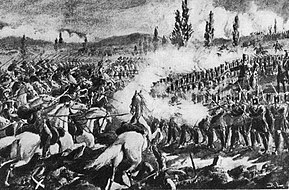Battle of Segesvár
| Battle of Segesvár | |||||||
|---|---|---|---|---|---|---|---|
| Part of the Hungarian Revolution of 1848 | |||||||
 The Battle of Segesvár (by László Bellony): Cossack charge against the Hungarian infantry. |
|||||||
|
|||||||
| Belligerents | |||||||
|
|
|
||||||
| Commanders and leaders | |||||||
|
|
|
||||||
| Strength | |||||||
| 6,000 | 12,000 | ||||||
| Casualties and losses | |||||||
| 1,200 dead 500 captured |
unknown | ||||||
The Battle of Segesvár (Transylvania, now Sighişoara, Romania) was a battle in the Hungarian Revolution of 1848, fought on 31 July 1849 between the Hungarian revolutionary army supplemented by Polish volunteers under the command of General Józef Bem and the Russian V Corps under General Alexander von Lüders in ally with the Austrian army led by General Eduard Clam-Gallas. The battle was won by the Russian-Austrian army and it is presumed that the Hungarian poet and national hero Sándor Petőfi died in the battlefield, though his body was never found.
Bem had returned to Transylvania after a sally to Moldavia against Russian forces under the command of General Ustrugov. He prepared an offensive against the Russian army group under General Grotenhjelm. He had to cancel this offensive because he got information that the Lüders, having captured the Vöröstorony pass (now Turnu Roșu Pass, Romania) and the city of Nagyszeben (now Sibiu, Romania), was advancing towards him. Bem knew that a battle against Lüders would be decisive for the campaign in Transylvania so he decided to concentrate his forces. He sent orders to Colonel Kemény, commander of the Kolozsvár (now Cluj-Napoca) Division, that it was to go to Segesvár (now Sighisoara, Romania) and support the main Hungarian forces in the fight against the Russian V corps.
...
Wikipedia
